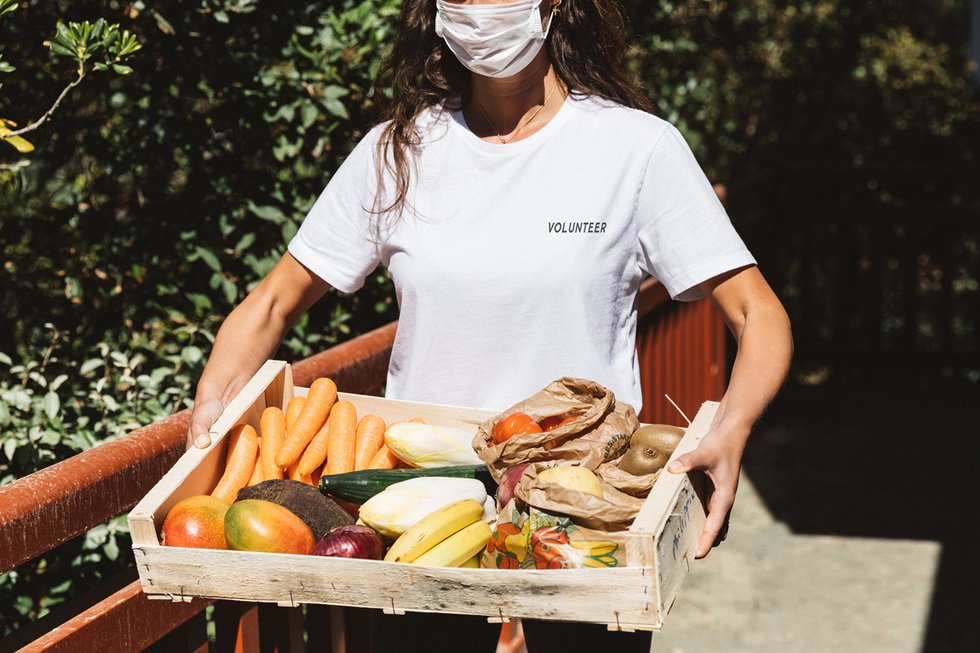Helping hands: the reality of volunteering during the Covid-19 pandemic
May 11, 2020
6 mins


Journalist
“Stay home. Protect the NHS. Save lives.” The UK Government’s message is clear: we can all do our bit during the coronavirus crisis just by staying at home. But many have decided to do more by volunteering time and energy to help their communities.
The latest figures from the Civil Society Almanac show that we are generally a charitable bunch. Four in ten of us—an estimated 20.1 million people—volunteered through a group, club, or organization in the UK in 2018. Since the lockdown began, the UK has seen an outpouring of solidarity. Mutual Aid groups have sprung up across the country in response to the crisis. When the NHS advertised for volunteers to help support vulnerable people, nearly five people per second enlisted in the Government scheme. In five days, the number of volunteers committing to join the NHS Covid-19 initiative had reached 750,000, three times higher than the initial target.
We canvassed four volunteers to learn how they balance work, life in lockdown, and volunteering—and how their experience has changed them forever.
Why volunteer?
Because it seems more important than ever
Mike Melvin is passionate about volunteering. He works as a volunteer coordinator for Aberdeen Council for Voluntary Organisations (ACVO), which supports Aberdeen’s third sector. Melvin, 47, also dedicates much of his free time to volunteering locally.
Local volunteering networks are streamlining their operations toward Covid-19 community response. Melvin, who has been with ACVO for 17 years, says that people seem more eager than ever to help others. *“I have never encountered so many people helping one another. This includes organizations that have been here for a long time already and also newly formed organizations,” he said.
Melvin has also signed up to the Scotland Cares COVID-19 volunteering program and the Dear Friend initiative in Aberdeen. This involves writing letters to care home residents or to those who feel isolated. The letters, which are handwritten or sent through an internet form are approved by staff and then passed on to those who have signed up for the program. “I write about myself, about what I am doing every day. I tell them about my work and what I watch on TV, like old football games, about the things I enjoy. It is more important than ever to find ways to support each other during these hard times,” said Melvin.
Because it’s helping me to connect with my neighborhood
The coronavirus pandemic has seen a rapid rise in grassroots activities known as “spontaneous volunteering”. Many people feel a need to offer help to neighbors or to set up local initiatives. Sarah Dobbie, 27, is one of them. Dobbie, a human rights lawyer, lives in Hampstead, North London. “Because of the nature of my work, it felt very hypocritical to go into isolation, work from home and care about other communities somewhere far away, but not know anything about the person next door,” she said.
“I have ‘adopted’ a set of grandparents down the road. The neighborhood finally feels like a neighborhood.”
She set up Hampstead Volunteer Corps, a network of neighbors helping neighbors, with her partner, Connor, and another couple, Kate and Brendan. Even before the lockdown, they started giving out flyers in search of volunteers while reaching out to those who might need help. Within a matter of days, they had the website up and running, and a large network of enthusiastic volunteers.
Dobbie manages the volunteers and tracks requests for help. “I have also ‘adopted’ a set of grandparents down the road. I cannot wait to catch up properly with them after the pandemic. The neighborhood finally feels like a neighborhood,” she said.
Because I have plenty of time on my hands
More than 70% of UK companies have furloughed staff as part of the Coronavirus Job Retention Scheme. Eliane Carmona, 24, wasn’t surprised when it happened to her. She works as a client success executive in a digital marketing start-up in London. “I was kind of expecting it. It was not the best news, but a lot of people lost their jobs so I was lucky in a way,” she said.
““I was motivated by the fear of not having anything to do, but I also wanted to do something important.”
Carmona felt lost and spent the first few days wondering how she would fill her days. When she saw a friend post that she was “cooking for the NHS”, Carmona figured she could do the same.
She joined Furloughed Foodies, a group of volunteers who cook and deliver meals to hospitals for health workers. “I was motivated by the fear of not having anything to do, but I also wanted to do something important,” said Carmona. She started out by cooking 30 meals and now she’s coordinating volunteer chefs and delivery drivers in North-West London.
How are you managing this new activity during lockdown?
It’s a big challenge
“It is strange to have overwhelming support but that support, instead of reducing workload, is somehow increasing it.”
The coronavirus outbreak has changed Laura Mclvor’s day job and volunteering routine significantly. McIvor, 35, lives in Exeter and works for St Petrock’s, a local charity for the homeless and vulnerably housed. She is also a long-term volunteer at a local food bank. “At the beginning of lockdown, we lost about 50% of our regular volunteers for age or health vulnerability reasons,” said McIvor. However, in the first week of lockdown, they received about 800 offers of help.
McIvor, who has been involved with the food bank for 12 years, says that Covid-19 has made her work here more challenging. There are more volunteers to coordinate and new safety precautions, plus the number of people who need the food bank has increased. “It is strange to have overwhelming support but that support, instead of reducing workload, is somehow increasing it,” she said.
Luckily, the workload in her regular job has diminished due to rough sleepers being moved to hotels, so she gets to spend extra time volunteering.
It’s replaced my day job
For Carmona, volunteering has pretty much replaced her day job. “I work more than I usually do at my regular job. I wake up at 8.30 am and sometimes I’m on the phone and computer until 9 at night,” she said.
There’s so much to do, from organizing weekly schedules for more than 500 volunteers, scheduling meal prep, and getting everything delivered on time. “The hardest thing to organize is a timely delivery. Just today, a driver’s car broke down, so I quickly needed to find a replacement to pick up the meals and deliver them to the hospital,” she said.
“Also, I try to make time for cooking, so yesterday I made 30 meals. It is still important for me to be a part of that process. I enjoy cooking so I try to do it once a week. It is quite therapeutic.”
It’s about time management
“My mother used to say that the busiest people always find more time. When you are short on time, you become a lot better at structuring it.”
Dobbie is successfully balancing her job as a lawyer with her volunteering responsibilities. A postponed bar exam means that she can take a break from studying and work on human rights-related research assignments for clients. Dobbie, who moved to the UK from Australia in 2017, is also involved in the human rights podcast RightsUp. “My mother used to say that the busiest people always find more time. When you are short on time, you become a lot better at structuring it,” she said.
She admits that time management was challenging when setting up the volunteering network required her undivided attention. “During the first week, I worked almost full-time (on it),” said Dobbie. Now the group has team managers, detailed guidelines, and a defined structure. “We have a weekly team call, and the four of us (the founders) take care of the inbox, but we rotate every two days.”
She says that the secret is to break larger assignments down into smaller tasks. “Also, I try to finish each day with a list of things I should do the next day, with their allocated time slots,” said Dobbie.
How has it changed the way you think about work?
Good intentions and energy go a long way
“My partner Connor came up with the best analogy: we are learning to build a plane as we are flying it!”
Dobbie says that volunteering has taught her about the power of improvisation. “Good intentions are never enough, but coming with good intentions and energy to solve a problem is a good start!” she said. “We learnt how to manage a network of volunteers and how to track requests. We learned to devolve our activities to team captains and team members. My partner Connor came up with the best analogy: we are learning to build a plane as we are flying it!”
She also points out that the founders chose to name the network Hampstead Volunteer Corps, which has no Covid-19 reference. “When this is all over, we’ll still have 700 volunteers. I don’t know what the future might look like for this group, but the manpower and the desire to help are present. We definitely hope to become a more established neighborhood group,” said Dobbie.
Job satisfaction is about more than money
“I definitely want to push myself towards a career that involves helping others. This experience has definitely opened my heart”
Carmona says that this experience has changed her. She would like to continue to volunteer “as a side project”, but doesn’t believe she will have time when she gets back to work. “I don’t think it would be physically possible to do both jobs,” she said. “But I definitely want to push myself towards a career that involves helping others—maybe charity work or fundraising, who knows? This experience has definitely opened my heart,” said Carmona.
As these kind souls prove, volunteering gives society a much-needed boost, but it also brings satisfaction, a sense of purpose, and personal growth. Let’s hear it for all the Covid-19 volunteers out there, going the extra mile to help the country in a time of crisis.
Follow Welcome to the Jungle on Facebook, LinkedIn, and Instagram, and subscribe to our newsletter to get our latest articles every day!

More inspiration: Inspiration for workers

From hobby to side hustle: 10 steps to turn your passion into a career in 2025
Have you been waiting for the right moment to turn what you love into a paid gig? 2025 is your time!
Dec 18, 2024

Patience, balance, and multitasking: How parenthood shaped my career
Parenthood changes everything—including your career. These working parents share exactly how.
Dec 11, 2024

The traits of a great boss (and how they make your work life better)
What makes a great boss? Effective leaders do more than manage tasks—they create a workplace where people feel supported, encouraged, and inspired.
Nov 13, 2024

Leading without limits: How to shine as a leader, title or no title
Lab expert Ginny Clarke explores how being a leader isn't just reserved for execs ...
Apr 09, 2024

How our burnt-out society can finally get some rest
Alex Soojung-Kim Pang unveils transformative strategies for slowing down our fast-paced lives.
Mar 19, 2024
The newsletter that does the job
Want to keep up with the latest articles? Twice a week you can receive stories, jobs, and tips in your inbox.

Looking for your next job?
Over 200,000 people have found a job with Welcome to the Jungle.
Explore jobs